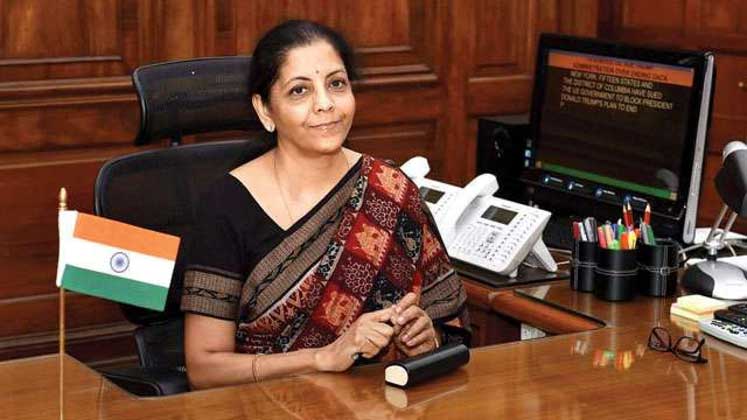
As the newly inducted Finance Minister Nirmala Sitharaman is all set to present her maiden union budget in the Parliament on July 5, the fashion retail and textiles industry is waiting in anticipation. Ever since NDA government came to power the first time in 2014, the economic focus has shifted a bit to the startups. In fact, the Narendra Modi-led government has advocated and encouraged ‘Make in India’ and ‘Startup India’ initiatives to further the economic growth.
The union budget of 2018 held a lot of promise for the retail sector which included the allowance of 100% FDI in the sector of single brand retail and it also granted industry status to the retail segment. These reforms not only widened the scope of consumption but also resulted in improvement in the overall turnover. The government had also reduced the corporate taxes for MSMEs to 25% which benefitted a large number of retailers. These and many more reforms directed towards ease of doing business did good for the overall retail industry, though there were hiccups like demonetization and haphazard implementation of GST.
The past indications by the government helped the industry remain optimistic on the forthcoming budget announcement. “We have high expectations from the upcoming budget. We can look back at the year that went by and see that there has definitely been some improvements in consumer sentiments and business confidence. The government has been proactive in taking decisions on rationalizing the GST law and tax rates, challenges in GST compliance, contradictory advance rulings and introduction of TCS, which continue to keep the industry on the edge. If the government addresses the above in the upcoming budget, it will help not just retailers, but also the end-consumer,” asserts Harkirat Singh, Managing Director, Woodland India.
Furthermore, according to sources, infrastructure creation and job growth will grab the limelight in the upcoming budget and rightly so as the interim budget has clearly reiterated the government’s commitment to infrastructure development. There definitely will be eyes on how the government’s commitment and thrust on infrastructure and also job creation is being taken into account. Nikhil Mohan, Founder and Director, Blackberrys, says, “We sincerely hope the new government generates enough confidence in the garment industry and entrepreneurs to invest in areas where there is high population density but infrastructure is weak and policies are uncertain. This will help retail businesses to expand their manufacturing units, creating more jobs and boosting the economy.” Harkirat Singh seconds even as he focused on need for policies needed to curb inflation for growth of retail and other sectors, “From the industry prespective, if retail players are going to penetrate in deeper India, like Tier III and IV cities, there need to be improved infrastructural facilities available. The measures for ease of doing business, including relaxation of non-compliance penalties, would be welcome. We hope that the government would also lay emphasis on curbing inflation as increased inflation affects consumer’s buying power which further affects the retail market. We hope to see favorable policies for the growth of the retail sector in this year’s budget.”
While the ‘Skill India’ initiative by the government is in place and is operational, a ministry data in November 2018 said that the government’s aim to skill one crore youth under the Pradhan Mantri Kaushal Vikas Yojana (PMKVY) by 2020 was found to be 64 percent short of meeting the target. “When we count on the 5 years of performance of the government, retail sector has witnessed significant growth. However, gap between demand and availability of skilled labour in retail industry still remains huge. To further accelerate growth of the industry, the new government must put in place measures such as skill based programs to develop skilled labour,” reiterates Nikhil Mohan.
The interim budget in February had proposed Rs.5,831.48 crore budgetary allocation for the textile ministry for 2019-20 which was 16.01 per cent lower than the current fiscal, which has created a concern among the textile industry. “With the onset of budget looming around the corner, many reforms are said to uplift the very framework of business that one conducts business in. The interim budget hadn’t brought great cheers to the textile segment. One can hope that the union budget would bring more financial allocations to bolster the industry,” points Monica Oswal, Executive Director, Monte Carlo. The original budget proposal was Rs.7,147.73 crore to fund various programmes and schemes for the textile sector. One of the leading and reputed fashion fabric firm, Donear Industries Ltd., also voiced concerns on the fund allocation. Ajay Agarwal, Executive Director, Donear Industries Ltd., avers, “We seek backing from the forth coming budget in terms of financing and regulatory norms pertaining to the fabric industry which take into account various fabrics like PV, cotton, wool, etc. Additionally, we expect simplification of tax laws prevailing in the fabric industry. Changes in scheme rates and policies that have been stagnant in the industry from past few years will not only lead to new growth prospects for the players in fabric manufacturing but will also take this industry to new heights.”
Meanwhile, Vipul Mathur, CEO, Mufti remained positive about the government’s intent towards the sector as he says, “The grants for the textile sector in the interim budget were fair, though lower than the proposed figure. It’s a statement of intent by the Indian government, who wants to promote the trade of textiles and retail, which is full of growth opportunities and a job-generating industry. Furthermore, Vipul Mathur expresses, “It would be helpful for the retail industry if the taxation on the retail, rent, infrastructures, etc. is reduced as doing so would certainly boost organized retail. With retail playing a significant role in India’s growth story, the policies pertaining to this respective industry should support the same.”
Moving forward, India has recently witnessed the stagnant garment exports sector. Exports dropped 3.46 per cent to US$ 16.37 billion in 2018-19 from US$ 16.7147 billion in the year-ago period and this has worried the garment industry lately. “We expect an aggressive export policy to be defined for the apparel industry to make Indian products competitive in the global market. Also, labour reforms should continue to optimize the production cost and make the products globally competitive,” maintains Akhil Jain, Executive Director, Madame.
The union budget 2019 will follow an interim budget that was presented in February by the then finance minister Piyush Goyal. While the expectations are high from Sitharaman, the recently appointed minister has chaired pre-budget meetings with finance ministers of states and union territories and also met representatives of various sectors to ascertain the concerns of the industries.







